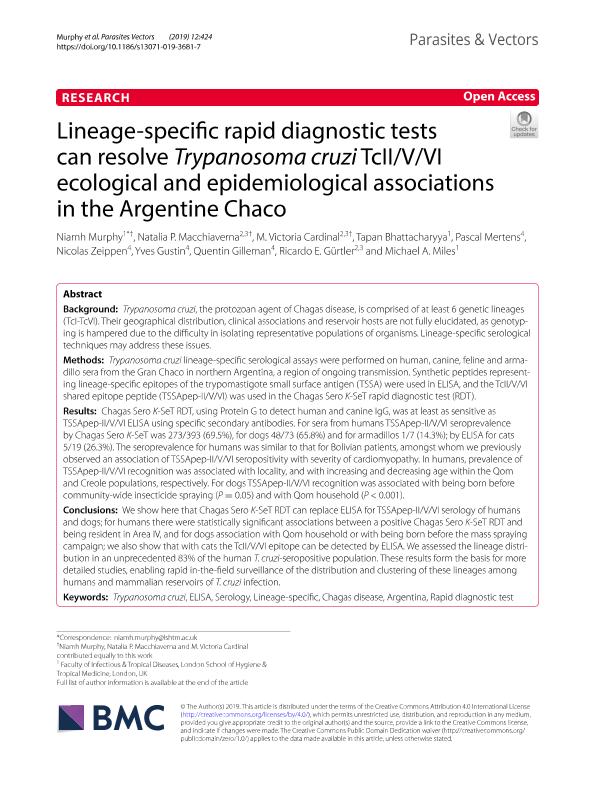Artículo
Lineage-specific rapid diagnostic tests can resolve Trypanosoma cruzi TcII/V/VI ecological and epidemiological associations in the Argentine Chaco
Murphy, Niamh; Macchiaverna, Natalia Paula ; Cardinal, Marta Victoria
; Cardinal, Marta Victoria ; Bhattacharyya, Tapan; Mertens, Pascal; Zeippen, Nicolas; Gustin, Yves; Gilleman, Quentin; Gurtler, Ricardo Esteban
; Bhattacharyya, Tapan; Mertens, Pascal; Zeippen, Nicolas; Gustin, Yves; Gilleman, Quentin; Gurtler, Ricardo Esteban ; Miles, Michael A.
; Miles, Michael A.
 ; Cardinal, Marta Victoria
; Cardinal, Marta Victoria ; Bhattacharyya, Tapan; Mertens, Pascal; Zeippen, Nicolas; Gustin, Yves; Gilleman, Quentin; Gurtler, Ricardo Esteban
; Bhattacharyya, Tapan; Mertens, Pascal; Zeippen, Nicolas; Gustin, Yves; Gilleman, Quentin; Gurtler, Ricardo Esteban ; Miles, Michael A.
; Miles, Michael A.
Fecha de publicación:
09/2019
Editorial:
BioMed Central
Revista:
Parasites and Vectors
ISSN:
1756-3305
Idioma:
Inglés
Tipo de recurso:
Artículo publicado
Clasificación temática:
Resumen
Background: Trypanosoma cruzi, the protozoan agent of Chagas disease, is comprised of at least 6 genetic lineages (TcI-TcVI). Their geographical distribution, clinical associations and reservoir hosts are not fully elucidated, as genotyping is hampered due to the difficulty in isolating representative populations of organisms. Lineage-specific serological techniques may address these issues. Methods: Trypanosoma cruzi lineage-specific serological assays were performed on human, canine, feline and armadillo sera from the Gran Chaco in northern Argentina, a region of ongoing transmission. Synthetic peptides representing lineage-specific epitopes of the trypomastigote small surface antigen (TSSA) were used in ELISA, and the TcII/V/VI shared epitope peptide (TSSApep-II/V/VI) was used in the Chagas Sero K-SeT rapid diagnostic test (RDT). Results: Chagas Sero K-SeT RDT, using Protein G to detect human and canine IgG, was at least as sensitive as TSSApep-II/V/VI ELISA using specific secondary antibodies. For sera from humans TSSApep-II/V/VI seroprevalence by Chagas Sero K-SeT was 273/393 (69.5%), for dogs 48/73 (65.8%) and for armadillos 1/7 (14.3%); by ELISA for cats 5/19 (26.3%). The seroprevalence for humans was similar to that for Bolivian patients, amongst whom we previously observed an association of TSSApep-II/V/VI seropositivity with severity of cardiomyopathy. In humans, prevalence of TSSApep-II/V/VI recognition was associated with locality, and with increasing and decreasing age within the Qom and Creole populations, respectively. For dogs TSSApep-II/V/VI recognition was associated with being born before community-wide insecticide spraying (P = 0.05) and with Qom household (P < 0.001). Conclusions: We show here that Chagas Sero K-SeT RDT can replace ELISA for TSSApep-II/V/VI serology of humans and dogs; for humans there were statistically significant associations between a positive Chagas Sero K-SeT RDT and being resident in Area IV, and for dogs association with Qom household or with being born before the mass spraying campaign; we also show that with cats the TcII/V/VI epitope can be detected by ELISA. We assessed the lineage distribution in an unprecedented 83% of the human T. cruzi-seropositive population. These results form the basis for more detailed studies, enabling rapid in-the-field surveillance of the distribution and clustering of these lineages among humans and mammalian reservoirs of T. cruzi infection.
Archivos asociados
Licencia
Identificadores
Colecciones
Articulos(IEGEBA)
Articulos de INSTITUTO DE ECOLOGIA, GENETICA Y EVOLUCION DE BS. AS
Articulos de INSTITUTO DE ECOLOGIA, GENETICA Y EVOLUCION DE BS. AS
Citación
Murphy, Niamh; Macchiaverna, Natalia Paula; Cardinal, Marta Victoria; Bhattacharyya, Tapan; Mertens, Pascal; et al.; Lineage-specific rapid diagnostic tests can resolve Trypanosoma cruzi TcII/V/VI ecological and epidemiological associations in the Argentine Chaco; BioMed Central; Parasites and Vectors; 12; 1; 9-2019; 1-11
Compartir
Altmétricas



